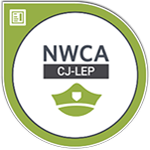PURPOSE
The Law Enforcement credential documents the essential competencies for law enforcement professionals.
AUDIENCE
This credential is appropriate for law enforcement professional including police officers, detectives, correctional officers, private detectives and investigators, probation officers, correctional treatment specialists, and other professionals in law enforcement support positions.
JOB/CAREER REQUIREMENTS
This credential documents competencies including the organization and administration of law enforcement in the United States, the roles and functions of police, the roles and functions of community-oriented policing, the organization and structure of state and federal law enforcement agencies, and the legal foundation of policing in the U.S. They must also understand the basic concepts and activities used in criminal investigation. Further, they must be able to effectively recognize and handle the many law enforcement challenges and issues such as strategies for investigating organized crime, gangs, drug-related crimes, and terrorism as well as those used in crimes involving youth, immigrants, the mentally ill, and homeless. Law enforcement must also be able to apply best practices related to personnel issues, police officer rights, and police unions. Finally, law enforcement specialists must be able to perform the numerous activities and techniques involved in crime investigation.
LAW ENFORCEMENT WORKPLACE TASKS:
- Police enforce laws, respond to emergencies, patrol areas in the communities, conduct traffic stops, issue citations, obtain warrants, arrest suspects, investigate crimes, prepare cases for court, testify in court, and write detailed reports
- Detectives investigate crimes, collect and secure evidence from crime scenes, conduct interviews with suspects and witnesses, observe the activities of suspects, obtain warrants, arrest suspects, prepare cases for court, testify in court, and write reports
- State troopers and high way patrol officers enforce traffic laws, issue traffic citations, and assist other law enforcement agencies
- Transit and railroad police patrol railroad yards and transit stations as they protect property, employees, and passengers from crime
- Sheriffs and deputy sheriffs enforce laws at the county level in their enforcement of county laws and operation of county jails
- Fish and game wardens enforce fishing, hunting, and boating laws as well as patrol hunting and fishing areas, respond to complaints and accidents, and educate the public about related laws
- Law enforcement professionals at the federal level investigate crimes and enforce federal laws and include FBI agents, Drug Enforcement Administration agents, U.S. Secret Services, Federal Air Marshals, and U.S. Border Patrol agents
- Probation and parole officers assist their clients in meeting the terms of their sentences, rehabilitation, and return to the community
- Social workers and case managers support law enforcement professionals by working with offenders, victims, and families providing resources and other assistance
- Correctional facility staff and corrections officers manage prisoners and staff of correctional facilities
- Counselors and therapists assist offenders, victims, families, and law enforcement professionals in coping with the effects of crimes and in rehabilitation of criminal behavior.
EXAM STRUCTURE OVERVIEW
Number of Questions in Exam: 60
Total Time: 30 minutes
Overall Passing Score: 70%
(All sections require an individual passing score of 70%)

